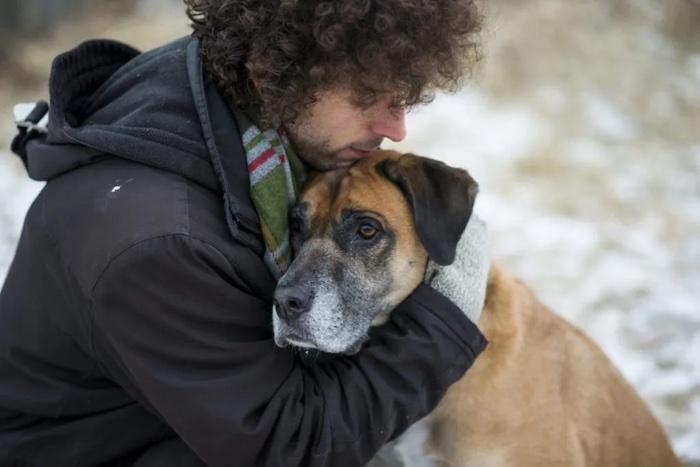— Here’s How We Can Help Them

“Grief affects our pets just as much as it does us,” Lorna Winter, an expert in dog behavior, tells Newsweek. So when a pup loses their favorite person, how can we help them?
We spoke with two professional dog behaviorists, and a veterinary medical officer, to find out what we can do to help a pet in mourning. It’s common knowledge that dogs can display a wide range of emotions akin to humans, meaning that they can also experience loss.
“Changes in primary caregivers can also be a big shock for them too as it’s a routine change and it’s not what they were used to,” Winter, a director of the UK Dog Behavior Training Charter and co-founder of Zigzag, continued.
Extra Affection
It can be easy to pinpoint when a dog is grieving, with common signs and symptoms including lethargy, loss of appetite and changes in behavior. Winter said that people close to the dog must try to make them feel more comfortable, to support them through the difficult time.
“Touching and cuddling releases oxytocin in a dog, especially when it’s with someone that they know and are bounded with. It feels nice for us too, so snuggle up,” Winter said.
Winter advises people keen to help grieving dogs to set some time aside within their day to connect with the mourning canine, and to make sure they’re having their emotional and physical needs met.
“It will be a tough time for them, so spend time with the dog, meet their needs and pamper them! That might be just petting your dog or laying together on the couch and watching television,” she added.
Animal behaviorist Kaelee Nelson echoed Winter’s advice. The San Diego-based behaviorist told us that a dog’s comfort should always be prioritized when they’re in mourning or emotional pain.
“Spend more time with your pet, making sure to give them extra affection and companionship to help alleviate feelings of loss and loneliness,” Nelson said.
She added that if the dog were to have a particular item that reminds them of the person that has moved or passed away, like a piece of clothing, that it should be left with them for comfort.
Danny Cox is the chief veterinary medical officer of Petzey, an on-demand digital service that connects pet owners with professional veterinarians.
Cox is in agreement with Winter and Nelson on the importance of paying a close eye to mourning pets, and providing them with as much extra attention as they need. He added that it would be a good idea for those keen to help settle their emotions to develop or follow a routine.
“Routines can offer pets stability. It’s important to maintain or establish a routine, and to monitor for signs of depression or anxiety,” Cox told us.
Nelson adds that this can be achieved by walking or feeding a dog at a similar time a day, or at the time they used to do these activities.
“This can provide a sense of security during a confusing time,” Nelson explained.
Keep Them Distracted
All three animal specialists shared that grieving dogs would benefit from having their minds taken off their dark situation. Just like us, dogs enjoy a change of scenery or a new activity in difficult times, and a distraction can definitely lift their spirits.
The easiest way to do this would be through exercise and stimulation, which can look like anything from a walk to an enrichment activity.
“Exercise is a great stress reliever for dogs, so take them on interesting walks to help them feel more relaxed when they are at home,” Winter said.
“Spend time with them, play games with them and teach them some new tricks with positive reinforcement training to help boost their mood and create positive feelings.”
She also suggested involving chews in more pressing times as chewing, despite being a soothing activity for dogs, can also help to release endorphins.
“If they’re social, rope in their doggy friends and let them play together. They’ll feel better to have the comfort of their own species when they’re feeling sad,” Winter added.
Nelson also champions the power of playtime in helping a grieving pet slowly move on. She encourages those keen to help a mourning dog to engage in regular play and exercise with them to help distract them and keep them physically healthy too.
“This can really help to elevate their mood,” she said.
Another thing that the trio can agree on is that pet dogs may act out when going through a difficult time, and that it’s important for new or recurring owners to be patient with them and give them time to adjust to this new reality.
Cox does add that if a behavioral change persists or becomes severe, concerned carers should speak with professional veterinarians for guidance.
Nelson agrees: “If your pet’s behavior changes drastically or they stop eating or drinking, it may be time to consult a veterinarian. They can provide additional advice or prescribe medications to help with anxiety or depression.”
While every pet is unique in breed and temperament and may grieve differently as a result, it’s crucial that those supporting a dog in mourning understand that while the dog’s in mourning, their love and support will absolutely help them process their love lost.
Complete Article ↪HERE↩!
